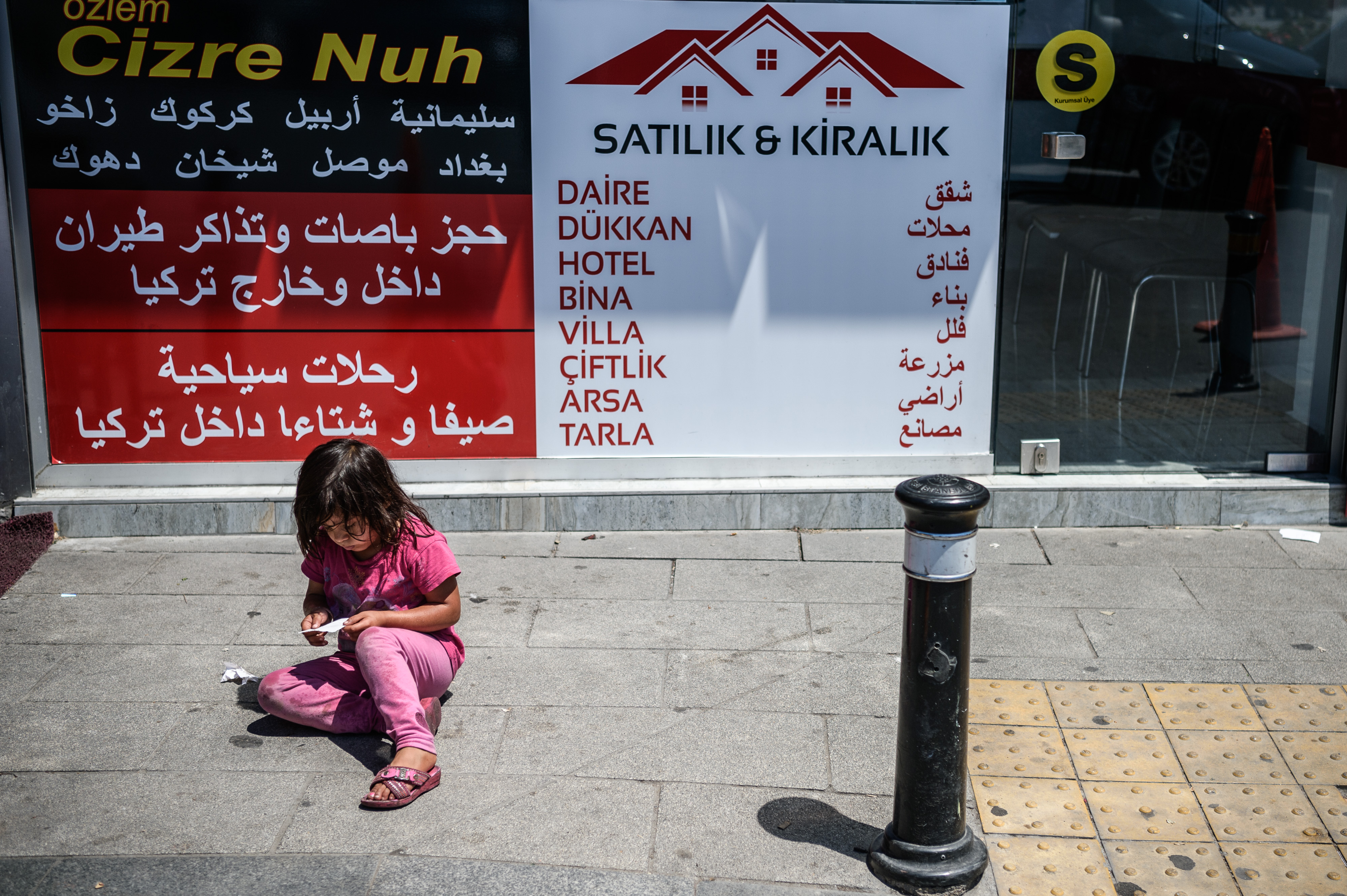
Receptionist, waiter, hairdresser, pastry-seller : these are the jobs of the young Syrians who abandoned their dreams in Damascus to start from scratch in Istanbul. In Fatih, a densely-packed neighbourhood that serves as a hub for Arabs living in Turkey’s biggest city, the signs of home are everywhere. / AFP PHOTO /
by Marisol RIFAI
ISTANBUL, Turkey (AFP) — Receptionist, waiter, hairdresser, pastry-seller: these are the jobs of the ambitious young Syrians who abandoned their dreams in Damascus to start from scratch in Istanbul.
In Fatih, a densely-packed neighborhood that serves as a hub for Arabs in Turkey’s biggest city, the traces of home are everywhere.
The delicate scent of Aleppo’s famous soap floats out of storefronts, mingling with the enticing aromas of the pistachio and almond pastries sold throughout Syria.
Rafik carefully piles a kilo of sticky baklava into a cardboard box bearing the legend “Treats from Damascus” in Arabic.
“I designed the logo for the shop and the packaging myself,” says the 27-year-old — a brief return to the creativity of his former days as an artisan wood carver.
“I always fought to study what I wanted. I was passionate about it and nothing could turn me away from art and design.”
But that was before the war that has been ravaging his homeland since 2011 — and before the army of Syrian President Bashar al-Assad began calling up young men like him for conscription.
“It wasn’t bombs that I fled — it was the possibility of becoming one of those people throwing the bombs,” says Rafik, who like other refugees would only give his first name.
Further up the road, Ahmad dozes in the summer heat at the restaurant where he waits tables, before the arrival of the first customers after the Ramadan fast ends at nightfall.
“My parents gave everything so I could do my accountancy studies,” says the 24-year-old, whose sad eyes don’t match his bright smile.
“Today I find myself far from them, in a country where I haven’t mastered the language and where, as a waiter, I have to do everything in the restaurant.”
But Ahmad has no regrets over his decision to head to Istanbul two years ago — even though he earns only 900 Turkish lira ($310, 280 euros) a month as a waiter and has to share a flat with three other Syrians to cover the rent.
“I had the choice between war and exile, and I didn’t even hesitate,” he says.
‘We have no country’
Turkey has taken in 2.7 million people from neighboring Syria since the start of the brutal conflict.
Ankara has refused to grant them official refugee status, referring to them as “guests”, though President Recep Tayyip Erdogan signalled recently that they could eventually be granted citizenship.
Very few have work permits and many struggle to eke out a living on odd jobs.
Around a tenth live in refugee camps, the rest in towns and cities — including some 350,000 who have come to Istanbul.
Nour, 26, arrived in the city alone a few months ago and now works as a receptionist in a language school founded by a fellow Syrian.
She won’t go into details about what pushed her to leave behind her “family, work and love life”, saying simply that she left for “ideological reasons”.
“I know I’m luckier than a lot of other Syrians who live in tents or who beg in the street, but that’s not enough to make me happy here,” she says, her voice cracking.
But she expresses pride at how young Syrians in Istanbul are doing their best to fit in.
“I feel like I can be useful to my compatriots here,” she said.
“Since our country can’t offer us anything anymore, we have to adapt to the Turks who have welcomed us and learn their language.
“Our students are mainly young Syrians in their 20s and 30s. They are very motivated and in less than six months they’re getting by in Turkish.”
Maher, a 29-year-old hairdresser, learnt his Turkish on the Internet.
“It’s quick and really efficient. If you’re motivated you can do anything,” he says.
In Damascus he had his own salon; here, he’s working for someone else.
“It’s not exactly the future I dreamed of,” he admits. “I hope I can go home one day.”
But pastry-seller Rafik doesn’t see himself ever going back to Syria.
“In 1948 the Palestinians thought they’d be going home in a few days — look where they are today,” he says.
“We don’t have a country anymore,” he adds, handing a box of cakes to a customer.
© 1994-2016 Agence France-Presse








